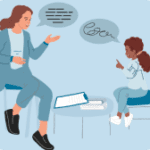Online Speech Therapy
with DrSensory Featured Speech Therapists
In today’s digital age, the rise of telehealth has revolutionized the way healthcare services are delivered, including speech therapy. With the convenience of accessing therapy from the comfort of your home, more parents and individuals are turning to online speech therapy to address various speech disorders. But how effective is it, and what can you expect? We hope the following will answer all your questions about online speech therapy.
What is Speech Therapy?
Speech therapy, also known as speech-language pathology, is a specialized form of therapy that focuses on improving communication skills and addressing swallowing disorders in individuals with speech or language impairments. It involves the assessment and treatment of various speech-related challenges, including articulation disorders, fluency disorders (stuttering), voice disorders, and language delays or disorders. Speech therapists may use techniques such as exercises, interactive games, and visual aids to help clients improve their overall communication abilities. Additionally, they may also address difficulties with swallowing through specific exercises and strategies. By working closely with clients, speech therapists aim to enhance their overall communication skills and increase their independence in daily activities, ultimately improving their quality of life. Overall, speech therapy is a crucial service that helps individuals of all ages overcome various communication challenges and achieve their full potential.

Can You Do Speech Therapy Online?
Yes, speech therapy can be effectively delivered online, providing a convenient option for individuals seeking to improve their communication skills. Telepractice for speech therapy utilizes video conferencing technology to connect clients with licensed speech-language pathologists (SLPs) from the comfort of their homes. This format allows for real-time interaction, enabling therapists to provide assessments, exercises, and feedback just as they would in a traditional face-to-face setting. Many patients find online speech therapy to be just as effective, if not more so, due to the personalized attention and flexible scheduling it offers. Additionally, therapists can incorporate various digital tools and resources to enhance the therapy experience, making sessions engaging and tailored to the client’s specific needs. As with physical and occupational therapy, it’s essential to ensure that the online platform used adheres to privacy regulations and provides a secure environment for discussing personal health information.

How Much Does Online Speech Therapy Cost?
The cost of online speech therapy can vary significantly based on several factors, including the therapist’s qualifications, the duration and frequency of sessions, and the specific platform used. On average, clients can expect to pay anywhere from $50 to $150 per session. Some therapists may offer package deals or subscriptions that reduce the overall cost per session if you commit to multiple appointments in advance. It’s also worth noting that some insurance plans may cover a portion of the costs associated with online speech therapy, so it is advisable to check with your provider to understand your coverage options. Additionally, many platforms provide flexible payment options, including sliding scales based on income, ensuring that quality speech therapy remains accessible to a broader audience. Always discuss costs with your therapist before beginning treatment to establish a clear understanding of any potential financial commitments. DrSensory offers competitive pricing to ensure that quality therapy is accessible to everyone.

Is Online Speech Therapy Effective?
Yes, online speech therapy has proven to be an effective modality for many individuals seeking to enhance their communication skills. Research indicates that the outcomes of telepractice are comparable to traditional in-person sessions, with many clients achieving significant improvements in their speech and language abilities. The effectiveness of online speech therapy lies in the ability to provide continuous, individualized attention while leveraging modern technology to facilitate engaging sessions. SLPs are trained to utilise virtual tools and resources that enhance client participation and keep the therapy process dynamic. Furthermore, clients often benefit from the convenience of online access, which can reduce barriers to therapy such as travel time and scheduling conflicts. Overall, with proper technology and a strong therapeutic alliance, online speech therapy can be a highly effective option for many individuals.
How Do I Know If My Child Needs Speech Therapy?
Determining whether your child may benefit from speech therapy can be guided by several key indicators. If you notice that your child has difficulty articulating words clearly, struggles to follow instructions, or has a limited vocabulary for their age, these could be signposts that warrant further evaluation. Additionally, if your child frequently has trouble communicating their thoughts or feelings, avoids speaking in social situations, or displays frustration when trying to express themselves, it may be beneficial to seek the advice of a speech-language pathologist (SLP). Early intervention is crucial, as addressing speech and language concerns at a young age can significantly enhance communication skills and academic success. If you have concerns, consult with your child’s pediatrician or a qualified SLP to discuss your observations and explore possible assessments or interventions.
What Are the Different Types of Speech Disorders?
Speech disorders encompass a range of conditions that affect an individual’s ability to communicate effectively. Each type has its own set of symptoms and requires specific therapeutic approaches.
Articulation Disorders
Articulation disorders occur when someone has difficulty pronouncing certain sounds correctly. This can result in speech that is hard to understand. Common articulation problems include substituting one sound for another, omitting sounds entirely, or distorting sounds.
Example:
- A child may say “wabbit” instead of “rabbit.”
Tips:
- Early intervention is key. Speech therapy can help correct articulation issues.
- Practice pronunciation at home using flashcards or interactive apps designed for speech improvement.
Phonological Disorders
Phonological disorders involve patterns of sound errors. Children with these disorders might simplify complex words by leaving out consonants or changing their order. Unlike articulation disorders, phonological disorders are related to the patterns of sound use rather than the physical production of specific sounds.
Example:
- Saying “gog” for “dog” or “tar” for “star.”
Tips:
- Speech therapy can help children understand the rules of sounds and how they fit together.
- Encourage reading and storytelling at home to expose children to correct sound patterns.
Fluency Disorders
Fluency disorders, such as stuttering, disrupt the flow of speech. Stuttering can involve repetitions of sounds or words, prolonged sounds, or abnormal stops within words.
Example:
- A person may repeat the beginning sound of a word (“b-b-b-ball”) or get stuck on a word (“mmmmilk”).
Statistics:
- Approximately 5% of children stutter at some point, but most outgrow it.
Tips:
- Be patient and give the person time to speak without interrupting.
- Consult a speech-language pathologist for tailored strategies and exercises.
Voice Disorders
Voice disorders affect the pitch, volume, or quality of the voice. These disorders can result from vocal abuse, like yelling or excessive talking, or from medical conditions such as vocal nodules or polyps.
Example:
- A hoarse or breathy voice that persists over time.
Tips:
- Encourage good vocal hygiene, including staying hydrated and avoiding shouting.
- Seek professional help if voice changes last longer than two weeks.
Apraxia of Speech
Apraxia of speech is a motor speech disorder where the brain struggles to coordinate the muscle movements necessary for speech. This condition can make it extremely difficult for individuals to form words, even though they know what they want to say.
Example:
- A child may have inconsistent speech errors and struggle to produce sounds correctly on demand.
Tips:
- Intensive, repetitive speech therapy is often needed to improve speech coordination.
- Use visual aids and gestures to support communication.
Dysarthria
Dysarthria results from muscle weakness affecting speech production, often due to neurological conditions such as stroke, cerebral palsy, or multiple sclerosis. Speech may be slurred, slow, or difficult to understand.
Example:
- A stroke survivor may have slurred speech due to weakened muscles.
Tips:
- Work with a speech-language pathologist to strengthen speech muscles and improve clarity.
- Use alternative communication methods, such as speech-generating devices, if necessary.
Cognitive-Communication Disorders
Often resulting from brain injuries or neurological conditions, these disorders impact a person’s ability to think, understand, and use language, affecting their overall communicative ability.
Understanding these types of speech disorders is essential for early recognition and intervention, as timely therapy can help individuals develop the necessary skills to improve their communication abilities.
Can Adults Benefit from Speech Therapy Too?
Absolutely, adults can significantly benefit from speech therapy. While commonly associated with children, speech and language disorders can affect individuals at any age, often as a result of medical conditions, injuries, or life changes. Adults may seek speech therapy to address issues such as voice disorders, articulation challenges, cognitive-communication difficulties, or even accents and dialect modifications. Additionally, those recovering from strokes, traumatic brain injuries, or neurological diseases could experience improvements in their communication skills through targeted therapy. Speech-language pathologists (SLPs) work with adults to develop personalized treatment plans that enhance speech clarity, boost confidence in communication, and support overall quality of life. Engaging in therapy can lead to significant progress, allowing adults to navigate personal and professional interactions more successfully.

How Long Does Speech Therapy Take to Show Results?
The timeline for seeing results from speech therapy can vary widely depending on several factors, including the nature and severity of the speech disorder, the individual’s commitment to the therapy process, and the frequency of sessions. In some cases, clients may notice improvements within just a few weeks, particularly for articulation issues or mild fluency disorders. However, more complex language or cognitive-communication disorders may require several months of consistent therapy before significant progress is observed. It’s essential to understand that every individual’s journey is unique; some may require intensive therapy, while others could achieve their goals with less frequent sessions. Regular assessments by a speech-language pathologist (SLP) can help track progress and adjust the treatment plan as needed to ensure the best outcomes. Collaboration between the SLP and the client, along with support and resources at home, can greatly influence the efficiency of reaching communication goals.
Is It Possible to Completely Overcome a Speech Disorder with Therapy?
Many individuals wonder whether it is possible to completely overcome a speech disorder through therapy, and the answer is often nuanced. While some clients may achieve significant improvements or near-complete resolution of their speech difficulties, others may find that their challenges persist to some degree. The extent of recovery is influenced by various factors, including the type and severity of the disorder, the age of the individual, the promptness of intervention, and their commitment to the therapeutic process. For instance, kids with articulation disorders may clear up their speech issues with targeted practice, while adults recovering from strokes might experience varying degrees of improvement depending on the methods used and their individual circumstances. Importantly, therapy aims not only to improve speech but also to empower individuals with strategies to adapt and communicate effectively, enhancing their overall quality of life. Therefore, while complete resolution is achievable for some, the primary goal of therapy is to foster communication skills that enable individuals to express themselves more confidently and fluently in their daily lives.

What Can I Expect During a Typical Online Speech Therapy Session?
A typical session involves a mix of activities tailored to the patient’s specific needs. This may include articulation exercises, language activities, and interactive games to make learning engaging. Therapists will also provide feedback and strategies to practice at home.
Initial Assessment and Goal Setting
The first step in any effective therapy program is assessment. During your initial online session, the speech therapist will likely conduct a thorough evaluation. This may involve:
- Questionnaires about medical history and communication challenges.
- Interactive activities to assess speech, language, and cognitive skills.
- Goal setting to establish clear, measurable objectives based on the assessment.
Tip: Be open and honest during the assessment. The more information you provide, the better the therapist can tailor the sessions to meet specific needs.
Personalized Therapy Plan
Once the assessment is complete, the therapist will craft a personalized therapy plan. This plan outlines the methods, activities, and tools that will be used to achieve the set goals. It’s usually shared with you digitally for easy reference.
- Evidence-based techniques tailored to address individual needs.
- Specific activities and exercises to work on during each session.
- Progress tracking mechanisms to monitor improvements over time.
Example: If a child struggles with articulation, the plan might include repetitive phonetic exercises and interactive games designed to make learning fun.
Engaging and Interactive Sessions
A core benefit of online speech therapy is the ability to use digital tools to create engaging and interactive sessions. Therapists use a variety of methods to keep the sessions lively and effective:
- Multimedia resources such as videos, animations, and apps.
- Real-time feedback to correct and guide practice.
- Games and activities specifically designed to enhance speech and language skills.
Statistic: Studies show that interactive methods can increase engagement by up to 60%, leading to better retention and faster progress.
Parental and Caregiver Involvement
For children, parental or caregiver involvement is crucial. Online speech therapy often includes:
- Guidance and training for parents to reinforce skills between sessions.
- Home practice activities that families can do together.
- Regular updates on progress and areas needing extra attention.
Tip: Parents should encourage and participate in the exercises at home to provide consistent reinforcement, which can significantly bolster the child’s progress.
Flexible Scheduling and Convenience
One of the standout benefits of online speech therapy is its flexibility. You can schedule sessions at times that suit your lifestyle, making it easier to:
- Maintain consistency without the hassle of travel.
- Attend from any location, provided there’s a reliable internet connection.
- Fit therapy into busy schedules, ensuring no interruption in progress.
Statistic: According to a survey, 80% of patients found online sessions more convenient than in-person appointments.
Progress Monitoring and Adjustments
Online platforms often have built-in tools for tracking progress. This helps in:
- Regularly reviewing and adjusting the therapy plan based on progress.
- Keeping records of exercises, successes, and areas that need more focus.
- Providing visual reports that highlight improvements and milestones reached.
Tip: Regularly review these reports with your therapist to stay informed and motivated.
Are There Any Home Exercises or Activities That Can Supplement Speech Therapy Sessions?
Yes, home exercises are a vital component of successful speech therapy. DrSensory therapists often assign activities such as reading aloud, practicing specific sounds, or using flashcards to reinforce skills learned during sessions.
Reading Aloud
Reading aloud is one of the simplest yet most effective ways to improve speech. It helps with pronunciation, fluency, and articulation.
Why It Works
Reading aloud requires clear articulation and attention to pronunciation, which strengthens speech muscles and enhances language skills. This activity can be tailored to suit any age group—from children’s storybooks to adult novels.
How to Implement
- Children: Choose engaging storybooks with repetitive phrases.
- Adults: Opt for novels, newspaper articles, or poetry.Tips:
- Start with short passages and gradually increase length.
- Focus on clarity and speed.
- Record the reading and play it back to identify areas for improvement.
Tongue Twisters
Tongue twisters are a fun way to practice articulation and improve clarity in speech.
Why It Works
By challenging the speaker to pronounce difficult sequences of sounds, tongue twisters help in enhancing pronunciation, speed, and control over speech muscles.
How to Implement
- Children & Adults: Begin with simple tongue twisters like “She sells seashells by the seashore” and gradually move to more complex ones.
- Tips:
- Repeat each tongue twister multiple times.
- Focus on precision over speed initially, then increase speed while maintaining clarity.
Singing
Singing can be a delightful and effective way to practice speech.
Why It Works
Singing slows down the rate of speech, allowing for better control over articulation and breath support. It also engages both the left and right hemispheres of the brain, which can help in improving language skills.
How to Implement
- Children: Sing nursery rhymes or children’s songs.
- Adults: Choose favorite songs or karaoke tracks.
- Tips:
- Sing along with the lyrics to practice pronunciation.
- Focus on breath control and pitch variation.
- Record singing sessions to track progress.
Word Games
Word games like Scrabble, Boggle, and crossword puzzles enhance vocabulary and cognitive skills related to speech.
Why It Works
These games require quick thinking and word retrieval, which can help in improving language comprehension and usage.
How to Implement
- Children: Play simpler word games like “I Spy” or “Hangman.”
- Adults: Engage in more complex games like Scrabble or crosswords.
- Tips:
- Set regular game times to build consistency.
- Play in a group to add a social element, enhancing communication skills.
Conversational Practice
Regularly engaging in conversations is crucial for reinforcing speech therapy techniques.
Why It Works
Conversational practice allows for real-time application of speech techniques, promoting natural speech flow and confidence in communication.
How to Implement
- Children & Adults: Set aside time each day for open-ended conversation.
- Tips:
- Discuss a variety of topics to expand vocabulary.
- Practice active listening and turn-taking.
- Use visual aids or topic cards to guide conversations.
Mirror Exercises
Using a mirror to practice speech can be highly effective in improving articulation and facial muscle control.
Why It Works
Visual feedback helps in understanding and correcting mouth movements and tongue placement, essential for clear speech.
How to Implement
- Children & Adults: Practice specific sounds or words in front of a mirror.
- Tips:
- Exaggerate mouth movements to clearly see the articulation.
- Focus on problem sounds or words.
- Pair mirror exercises with other activities like reading aloud.
Storytelling
Storytelling is an engaging way to enhance narrative skills and improve fluency.
Why It Works
Creating and narrating stories encourages the use of a broad range of vocabulary and sentence structures, fostering better language skills.
How to Implement
- Children: Use picture books to create stories.
- Adults: Tell personal stories or create fictional narratives.
- Tips:
- Encourage descriptive language and detailed narration.
- Record stories to review and refine.
- Share stories with family or friends for feedback.
Is Insurance Coverage Available for Speech Therapy Services?
Yes, insurance coverage for speech therapy services is often available, but it can vary significantly depending on the insurance provider and individual policy. Many health insurance plans, including Medicaid and Medicare, cover speech therapy when it is deemed medically necessary to treat conditions such as stroke, brain injury, or developmental delays. However, certain plans may have specific requirements, such as prior authorization, a specific number of sessions covered, or limitations on the types of conditions that qualify. It’s essential to review your insurance policy and consult with your provider to understand the specifics of your coverage for speech therapy services.
Can Virtual or Online Speech Therapy Be Just as Effective as In-Person Sessions?
Virtual or online speech therapy has gained significant traction, especially in recent years, and research suggests that it can be just as effective as traditional in-person sessions for many individuals. This format offers the flexibility of attending therapy from the comfort of one’s home, which can reduce barriers such as travel time and cost. Many speech-language pathologists (SLPs) utilize various digital tools to assess and treat speech and language disorders, allowing for interactive activities that engage clients effectively. However, the efficacy of online therapy can depend on several factors, including the client’s specific needs, the quality of the technology used, and the therapeutic relationship built between the client and the SLP. While some individuals may prefer in-person interactions for personal connection and feedback, others may find online platforms just as enriching. Ultimately, the effectiveness of virtual speech therapy hinges on the commitment of both the client and the therapist, as well as the ability to adapt strategies to meet the individual’s communicative goals.
How Do I Find a Qualified and Reputable Speech Therapist?
Look for therapists who are certified by the American Speech-Language-Hearing Association (ASHA) and have experience relevant to your specific needs. DrSensory only partners with highly qualified SLPs to ensure you receive the best care.
Can a Speech Therapist Also Help with Feeding and Swallowing Issues?
Yes, speech therapists, particularly those with specialized training in feeding and swallowing disorders, can effectively assist individuals facing difficulties in these areas. Speech-language pathologists (SLPs) are trained to evaluate and treat a range of communication and swallowing disorders, including dysphagia, which is the medical term for swallowing difficulties. They employ various techniques to assess swallowing function, identify potential underlying issues, and develop tailored therapy plans to improve safety and efficacy during feeding. In addition to direct therapy, SLPs often work collaboratively with dietitians, occupational therapists, and medical professionals to provide comprehensive care. This teamwork ensures that individuals receive holistic support, addressing both feeding challenges and nutritional needs. The ultimate goal is to enhance the quality of life for those experiencing swallowing difficulties, enabling them to enjoy food and maintain proper hydration safely.
What Is the Difference Between a Speech Delay and a Language Disorder?
Understanding the distinction between a speech delay and a language disorder is crucial for addressing communication challenges effectively. A speech delay refers to a situation where a child appears to have a slower-than-expected progression in developing spoken language skills. This can manifest as limited vocabulary, difficulty articulating sounds, or a delay in the ability to combine words into sentences. A speech delay is often considered a developmental issue that may resolve on its own as the child matures and receives appropriate support.
In contrast, a language disorder encompasses more extensive difficulties that affect both understanding and use of language, going beyond mere delays in speech. Individuals with language disorders may struggle with grasping the meaning of words, forming sentences, or using language socially. These disorders can be inherent and persist into later childhood or adulthood, causing challenges in both academic and social settings. Distinguishing between the two is vital, as it informs the appropriate therapeutic strategies and interventions needed to support the individual’s specific communication needs. Early intervention can be especially beneficial, allowing for targeted therapy to address the unique aspects of speech delays or language disorders.
Are There Any Side Effects of Speech Therapy?
Speech therapy is generally a safe and beneficial intervention with minimal side effects; however, individuals may experience some temporary challenges as they adjust to new communication strategies. For example, during the initial stages of therapy, clients might feel frustrated or overwhelmed as they work to master new skills or navigate difficult exercises. Additionally, frequent practice may lead to vocal fatigue or mild discomfort, particularly for those engaging in intensive speech exercises. It is also essential for speech-language pathologists (SLPs) to monitor emotional responses throughout the therapy process, as some individuals might feel anxious about their progress or the challenges they face. Open communication with the therapist can alleviate these concerns, ensuring that the therapy remains a positive and constructive experience. Overall, with proper guidance and support, the benefits of speech therapy typically far outweigh any minor drawbacks experienced during treatment.
Will My Child Outgrow Their Speech Disorder Without Therapy?
While some children may outgrow certain speech disorders without formal intervention, it is not guaranteed and varies significantly based on the individual circumstances. Many speech delays can resolve as a child matures and gains further exposure to language and social interactions. However, this is not true for all speech disorders, especially those that may have underlying developmental or neurological factors. Without therapy, children might miss opportunities to develop crucial communication skills, which can affect their social interactions and academic success in later years. Therefore, it is advisable for parents to seek professional evaluation if they have concerns about their child’s speech development. Early intervention can lead to more effective outcomes, helping to address any issues proactively and supporting overall growth in communication skills. Understanding the specific nature of the disorder is essential in determining the best course of action for supporting a child’s development.
Can I Still Attend Speech Therapy If I Have a Stutter or Other Fluency Disorder?
Absolutely, individuals with stuttering or other fluency disorders can benefit significantly from attending speech therapy. Speech-language pathologists (SLPs) are specially trained to work with clients experiencing fluency challenges, employing a variety of therapeutic techniques tailored to the individual’s needs. These techniques may include strategies to improve speech fluency, enhance overall communication skills, and develop effective coping mechanisms for managing anxiety related to speaking situations. Attending therapy can provide a supportive environment where clients can learn to communicate more confidently and effectively. Furthermore, therapy can help cultivate a strong understanding of the disorder, fostering self-acceptance and resilience. Many people with fluency disorders have found that regular sessions with a qualified SLP not only improve their speech fluency but also contribute to their overall quality of life by empowering them to express themselves more freely.
Ready to take the next step? Schedule a consultation with a DrSensory Featured Speech Therapist today and start your journey toward better communication.
Check Out Our Therapist Database
Find a physical, occupational, or speech therapist that fits your needs and book a consultation!












 Speech Therapy
Speech Therapy Physical Therapy
Physical Therapy Occupational Therapy
Occupational Therapy
